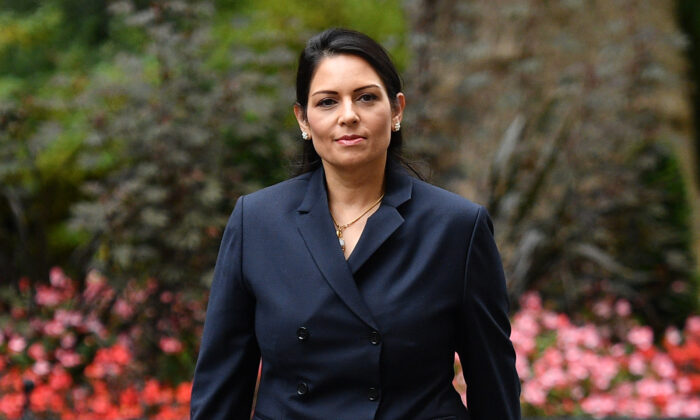Justice Department Watchdog Probing Handling of Stone Sentencing
British government ministers were pressed by the media on Monday and Tuesday over whether people in England should report their neighbors to the police if they thought they were breaking the government’s new “rule of six” regulations to restrict social gatherings.
The “rule of six” became law on Monday amid the ongoing CCP virus pandemic. It makes, with some exceptions, gatherings either indoors or outdoors of seven or more people illegal in England.
Britain’s Home Secretary Priti Patel and Crime Minister Kit Malthouse were both put under pressure in separate media interviews to answer whether people should report their neighbors for rule breaches, both conceding that people should in some circumstances call the police.
Several British media, however, reported that ministers were advocating for the public to call the police on their neighbors, leaving out the wider context surrounding their comments.
Interruptions
Patel was interrupted several times as she tried to answer the question.
On Tuesday, when a Sky News reporter asked hypothetically if she should call the police on her neighbor if there was a party of a dozen people in the garden next door, Patel initially said, “Well that’s your call—that’s a personal choice of yours if you want to do that.”
 In this file photo, Kit Malthouse poses after speaking to press about the Metropolitan Police’s Operation Blunt in London on May 29, 2008. (Cate Gillon/Getty Images)
In this file photo, Kit Malthouse poses after speaking to press about the Metropolitan Police’s Operation Blunt in London on May 29, 2008. (Cate Gillon/Getty Images)The last part of Patel’s answer was over-ridden, however, with an abrupt, “What is the government advice?” from the interviewer.
Patel responded with, “The government advice is pretty clear, people should not be gathering …”
Again, Patel was interrupted before she could finish her answer as the interviewer asked, “So what should I do if my neighbor is breaking the rules?”
Attempting to respond, Patel was interrupted a third time with, “What’s your advice?” following which she conceded, “You could call the police if you choose to do that.”
Further pressed, Patel was then asked what she would personally do about neighbors breaking the rules.
“If I saw something that I thought was inappropriate, then, quite frankly, I would effectively call the police,” she replied.
Then, as she was attempting to elaborate on her answer, Patel was interrupted a fourth time with, “So you would dob in [inform on] your neighbor?” To which she responded it was not about “dobbing in neighbors but about us taking personal responsibility …”
Interrupted for a fifth time with, “What would you do if your neighbor was having a big party?” Patel responded with, “If there was a big party taking place it would be right to call the police.”
Definitive Pronouncement
Interviewed by BBC Radio 4’s Today program on Monday, Crime and Policing Minister Kit Malthouse was similarly pressed for a definitive pronouncement on whether people should report their neighbors to the police for “rule of six” breaches.
Despite responding that the choice for people to report their neighbors to the police for non-compliance with the new CCP virus restrictions was “open” and an “option,” the Radio 4 interviewer repeatedly reframed her questions until Malthouse conceded with, “If they are concerned and they do see that kind of thing, then absolutely they should.”
Testing Concerns
The “rule of six” clampdown on social gatherings comes amid concern that people are struggling to get tests for the CCP (Chinese Communist Party) virus, commonly known as novel coronavirus, especially in areas where the infection rates are highest.
Patel said that tests were available for people in their local areas and that Public Health England was adding capacity and ensuring more testing was available on a daily basis.
“The majority of tests are available within a 10-mile (16-km) radius,” she told BBC TV, although she conceded that in some extreme cases people wouldn’t be able to get a test within that radius.
 A sign shows traffic where to turn to enter a CCP virus testing centre in Oldham, England, on Aug. 20, 2020. (Lindsey Parnaby/AFP via Getty Images)
A sign shows traffic where to turn to enter a CCP virus testing centre in Oldham, England, on Aug. 20, 2020. (Lindsey Parnaby/AFP via Getty Images)UK media reported many examples of people in virus hotspots unable to get tests, while NHS Providers, a body representing hospital, community, and ambulance services in the state-run health service, said on Twitter that current testing shortages were starting to impact health services ahead of the winter.
The new “rule of six” restriction for England carries a fine for non-compliance of 100 pounds ($129) for the first offense, which doubles on subsequent offenses up to a maximum fine of 3,200 pounds ($4,142).
Reuters contributed to this report
Focus News: British Ministers Pressed Over Whether People Should Report Neighbors for ‘Rule of Six’ Violations
Daimler to Pay $2.2 Billion in Diesel Emissions Cheating Settlements
